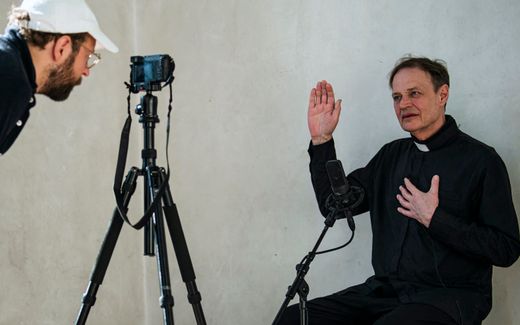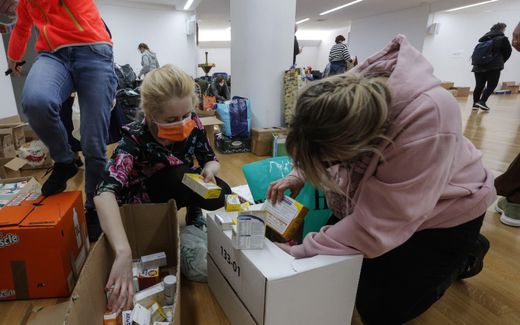Open the door to receive a stranger
23-07-2022
Opinion
Gertrude de Wildt-Brouwer, RD

Photo Unsplash
Opinion
An open house and an open heart. Some space on the couch, an extra chair at the table or a bed for unexpected visitors. A hospitable Christian unites himself to the tradition of the believers from the Bible book of Acts, who brake the bread in each other's houses "with gladness and simplicity of heart."
Anyone who opens the Bible finds many examples of hospitability. Together they form, with the believers of today, an extended "street" of open houses. That starts in the tents of the Patriarchs and the upper room in Shunem for the prophet Elisha. In the New Testament, we find the home of Simon the Leper in Bethany. The newly converted Lydia opens in Thyatira a house church.
People in the Old and New Testament opened their tents or gates wide. That was also for their own benefit because bartering was a common practice at the time. But there is also the possibility of the visit of an angel, Manoah discovered with shock.
Sometimes, these hospitable hosts and hostesses granted too much to their guests, like Lot, who offered to give up his daughters to protect his guests. Martha received her visitors with a busy and sulking heart. But all these people still welcome their guests.
Of course, they do. Did not Father Abraham himself start with the practice? Everyone who grew up in a hospitable home knows that guests often bring joy. The table is set with delicious food, and people take time for each other. The children in the house of Israel grow up with the experience of Abraham and Sarah in the background. In Abraham's tent, a tender and good calf was butchered. Why would the widow in Zarephath not use her last bit of oil and flower to welcome her guest warmly?
Husband and wife work together
The faithful in the Bible have even more reason to be hospitable. There is no separation between work and home. The American theologian Sandra Richter writes about the "beth ab", the father's house, in her book "Epic of Eden". Anyone imagining such a house understands why the saying "behind the door" does not fit homes from that time.

A beth ab is at the same time also the forge, the tannery or the place for another sort of craft. Downstairs is for the animals and the fire. On the roof, the nets are drying and look, there is the neighbour who wants to borrow a bit of oil. You can come inside. A sister-in-law from Hebron has also moved into this house with her children because her husband passed away. Fortunately, she is a good seamstress. In the father's house, there is also space for them.
In a beth ab, husband and wife work together. Theologian Vera Tukker emphasises in her book "Sara, waar ben je?" (Sarah, where are you?) the task of the wife and mother: gladly serving in a hospitable house. Sara Richter shows that the father's house, the Pater Familias carries the responsibility for all the inhabitants of the house – the grandmother, a disabled brother, a wife and a child, and a sheep with three legs. And especially where the master of the house opens his door for orphans, widows and strangers, the happiest place is found, as the Bible shows. A good father spreads his wings, like Jethro, who protected the fleeing Moses and Boaz, who saved Ruth.
Many mansions
The same space, protection and activity in the father's house also resound in the words of the Lord Jesus. His sermon is written down in John 14: "In My Father's house are many mansions; if it were not so, I would have told you. I go to prepare a place for you." Who would, knowing these words, dare to keep his house closed – even though today's houses are no father's houses with extended families and business in the home? A hospitable household is a foretaste of heaven.
In the time after Jesus's time on Earth, the last Bible authors encourage their readers to show hospitability. In Romans 12, Paul says: "given to hospitability." In the letter to the Hebrews, the author admonishes his readers not to forget hospitability. "Philoxenia" is the Greek word the New Testament uses for hospitability; love to the stranger. The stranger is someone who is not familiar to us, and thus we do not love naturally. Maybe the stranger even scares the host. Yet, he approaches the stranger as a friend. In the Christian tradition, openness towards the other has always been inherent.
Benedict of Nursia (480-547), the father of monastic life, maintains the following rule in his Italian Abbey of Monte Cassino: "All guests who arrive, must be received like Christ Himself. Because once, He will say: "I came as a guest, and thou receivest me." Everyone is honoured as he deserves, but especially believers and strangers are warmly welcomed. As soon as a guest knocks on the door, the abbot and the brothers will approach him with the most loving courtesy. First, they must pray together, and then they greet each other with a kiss of peace."

Benedict knows the nature of man. Therefore, he also admonishes people who would rather receive friends with presents than demanding guests: "Especially when receiving poor people and strangers, one should take care. In them, one receives Christ especially; because the respect that the rich instil will lead to honours anyways.
Monasteries are, partly due to Benedict's prescription, good shelters for tired travellers during the Middle Ages. The network, spread over Europe, is not luxurious but grants spiritual riches and no profit.
Tight grip on the wallet
A millennium after Benedict lived, the hospitability of the father's house and the monastic life are united in the Black Monastery. Martin Luther and Katharina von Bora clarify with their marriage that they do not listen to the order of celibacy.
In Luther's house, there is not only space for his own family with six children. Also, Luther's sister, a widow and mother of five children, moves into the couple's house. In addition, students from Luther's lecture halls sleep there. Käthe, the name Martin always calls his wife, takes care of the meals, together with the house's other inhabitants. The food comes from her garden and the pigs she keeps in her yard. Martin always holds his banquet speeches during the meals.
Luther's generosity towards guests is well-known. Therefore, Käthe has to keep a tight grip on the wallet sometimes. Once in a while, this leads to a conflict between them. "Dear Käthe, you should sell those silver beakers if we do not have any money left. When you want to have something, you have to give something away first. God will take care of something else instead." That is the reformer's logic; thus, he formulates the solution to Käthe's problems.
Known for friendliness
In 1741, theological student Samuel Hopkins dismounts his horse in front of the parsonage of Jonathan and Sarah Edwards. The welcome is so warm, and the bond between them is so tight that Hopkins later expresses his appreciation in a biography on the life of the revival preacher. Edwards himself has a reserved character, Hopkins discovers. But his wife Sarah compensates. Hopkins writes about the minister's wife, freely translated as: "She was known for her friendliness to friends and people who visited her house to talk to her husband. She was especially friendly to strangers who passed by their house. She had an eye for their comfort and would take care of it too. Even more, she did her best to get to know the stranger's heart so that she could learn how to do him or her well."
Openness takes effort
It is not difficult to find more historical examples in Christianity of open houses and open hearts. Remarkably, most of them come from a time when preparing a meal and a place to sleep for guests took much more effort than it does nowadays.
Probably, the old writings paint a rosier picture of that time of preachers' wives who were always ready to serve and people who always had time for the other when the bell rang. Sarah Edwards's sighs before she opens the door for just another visitor are not written down by Hopkins.
Saar van de Woestijne does write about the sighs. She does so in her columns in the Dutch daily Reformatorisch Dagblad. The mother of five children lives with her family on the Arabic Peninsula. Sometimes she years for rest and time with her family amidst all the baklava baking neighbours who revisit her time and time. It is honest of her to show these hesitations and negative feelings. Saar also shows the other side: "But sometimes the bell rings. Then a boy stands in front of our house, smiling from ear to ear. "Khalid is back", we call out then. And we welcome him like we always do, this son seeking peace."
Facing the challenge
The Netherlands in 2022 is very different from the culture there and then. Houses are often empty because of work and other duties outside the home and holidays. It is easy to fall back in nostalgia for times when the community played a more significant role. A better way to go is to face the challenge and invite people or step over the doorstep of other houses.
At the moment, there are many houses where Ukrainians are received with friendliness, a bed, bath and bread. These houses are marks of hope. The experiences of the shown hospitability are diverse. Sometimes, the relationship is good, and no dissonance is heard. Sometimes, it is very hard, and guests have to find another place.
The questions of the Lord Jesus are not bound to time and place. Who grants the thirsty a drink? Who gives food to the hungry? Who offers the stranger a place to stay? Who clothes the naked? Who responds to that question with the answer: "Can I, with my house", opens a door in the long street with open houses; a street that reminds us of the Father's house that is being prepared.
This article was translated by CNE.news and previously published in Dutch daily Reformatorisch Dagblad on June 3th, 2022.
Related Articles






